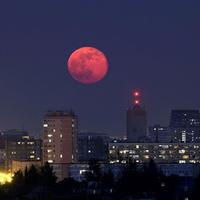Maloftaj vidindaĵoj
Rare sights
Rzadkie zabytki
Pontos turísticos raros
Редкие достопримечательности
Tre malofte okazas, ke dum kelkaj laŭvicaj tagoj super Polujo ne aperas eĉ unu nubeto.
It is very rare that for a few consecutive days not a single cloud appears over Poland.
Очень редко бывает, что несколько дней подряд над Польшей не появляется ни одной тучки.
Tiu fenomeno en nia kaprica modera klimato ĝojigas nin ĝuste nun.
This phenomenon in our capricious temperate climate makes us happy right now.
Это явление в нашем капризном умеренном климате радует нас прямо сейчас.
Danke al altoj sur nia ĉielo mankas eĉ nedanĝeraj nubaĵoj.
Thanks to elevations in our sky, even harmless clouds are missing.
Благодаря высоте на нашем небе не хватает даже безобидных облаков.
Alvenas tre seka aero, kiu limigas konvekton, kiu kaŭzas disvolviĝon de nuboj.
Very dry air arrives, which limits convection, which causes cloud development.
Поступает очень сухой воздух, что ограничивает конвекцию, вызывающую развитие облаков.
La ĉielo prezentas sian profundan bluon, kiu nin ĝojigas, ĉar ĝi plibonigas nian farton, agordon, dum malfacilaj tagoj, kiujn ni devas pasigi inter la muroj de niaj domoj plurloke en la mondo.
The sky presents its deep blue, which makes us happy, because it improves our well-being, tuning, during difficult days that we have to spend between the walls of our houses in many places in the world.
Sur satelitaj fotoj ni ne rimarkos eĉ unu nubeton, tamen ni povas distingi karakterizajn elementojn de nia pejzaĝo, kiuj elementoj estas ĉefe la riveroj Vistulo kaj Odro kaj la Grandaj Mazuriaj Lagoj, kiuj videbliĝas pro sia grandeco.
On satellite photos we will not notice a single cloud, however we can distinguish characteristic elements of our landscape, which elements are mainly the rivers Vistula and Odra and the Great Masurian Lakes, which are visible due to their size.
Indas rigardi direkte al la Tatry-montaro, kiu briletas per blanko.
It is worth looking towards the Tatry mountain range, which glitters with white.
De la vintro kuŝas tie neĝo, kiu verdire dum ĉiu varma tago iom post iom degelas, tamen ĝi daŭre abundas.
From the winter there lies snow, which, in fact, gradually melts during each hot day, but it is still abundant.
Sur la pinto Kasprowy Wierch estas da tiu neĝo eĉ unu metro.
Ni ofte pripensas, kial Pasko ĉiujare estas festata en alia tago.
We often wonder why Easter is celebrated every day on another day.
Foje ĝi okazas marte, kiam kuŝas neĝo, alifoje en aprilo, kiam povas jam esti varme.
Sometimes it happens in March, when there is snow, other times in April, when it can already be hot.
Kiu do kaj baze de kio difinas la daton?
So who and on what basis defines the date?
Montriĝas, ke la dato de Pasko estas difinata helpe de astronomiaj fenomenoj, kaj pli precize – de la Luno.
It turns out that the date of Easter is determined by astronomical phenomena, and more precisely - by the Moon.
Oni fiksis tion dum la sinodo en Nico, kiu okazis en la 326-a jaro.
This was fixed during the synod in Nice, which took place in the year 326.
Laŭ la sinodaj instrukcioj Pasko okazas plej proksiman dimanĉon post la unua paska Luna pleno, t.e.
According to the synodal instructions Easter takes place next Sunday after the first Easter Lunar full moon, ie
la unua pleno post la 20-a de marto.
Ordinare oni aplikas la reguleton, ke Pasko estas fiksata dimanĉe post la unua printempa pleno de la Luno laŭ la astronomiaj datenoj.
The rule that Easter is fixed on the Sunday after the first spring full moon of the Moon is usually applied according to astronomical data.
Tamen ĉi tiu principo ne funkcias ĉiun 19-a jaron, kio okazis antaŭ unu jaro.
Ĉi-foje Paskon ni festos laŭregule.
This time we will celebrate Easter regularly.
Ĝuste tiun specialan nokton ni havis ĉi-jare la 7-an de aprilo, kaj ĝi estas nomata superpleno.
Exactly that special night we had this year on April 7th, and it’s called overcrowding.
Nia satelito estis je 14% pli granda kaj je 32% pli hela ol kutime.
Laŭ simpla kalkulado rezultas, ke Paskon ni festos la dimanĉon de la 12-a de aprilo.
From a simple calculation it turns out that we will celebrate Easter on the Sunday of April 12th.
Merkrede la 8-an de aprilo mi estis vokita de mia edzino, kies kolegino ĵus telefonis, anoncante pri la apero de nekutime granda kaj malhele flava Luno.
On Wednesday, April 8, I was called by my wife, whose colleague had just made a phone call, announcing the appearance of an unusually large and dark yellow Moon.
Por rigardi la okazaĵon mi devis grimpi mian tegmenton, ĉar la Luno tiuhore troviĝis ankoraŭ tre malalte, do pluraj objektoj kurtenis ĝin en mia urba ĉirkaŭaĵo.
To watch the event I had to climb my roof, as the Moon at that hour was still very low, so several objects curtained it in my urban surroundings.
Mi do konfirmas ĉion, kaj kiam kelkaj el vi estos aŭskultantaj mian voĉon aŭ legantaj ĉi tekston, malgraŭ multaj limigoj de la nuntempo (por ke ne okazu pli grandaj) la kristanoj festos sian plej gravan feston en tre neordinaraj cirkonstancoj.
So I confirm everything, and when some of you will be listening to my voice or reading this text, despite many limitations of the present (so that it does not happen bigger) the Christians will celebrate their most important holiday in very unusual circumstances.
Jen povas esti tre instrua tempo por multaj homoj.
This can be a very instructive time for many people.
Antaŭ ĉio: Trankvilan kaj Ĝojplenan Paskon!
First of all: Happy and Happy Easter!

